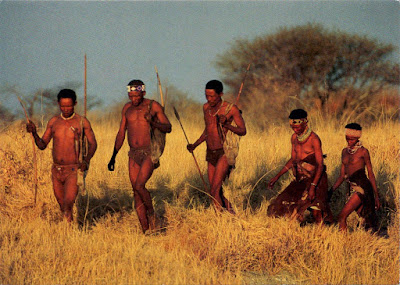July 2, 2021
Posted by Jay Livingston
In the previous post about the arrogance of economics, I said that economists seem to treat ethnographic evidence as an inferior form of knowledge, an interesting diversion but not really necessary to understanding what people are all about. Now anthropologist James Suzman, in a recent interview with Ezra Klein,* says that the basic assumptions of economics, assumptions that economists and most of the rest of us take as universal truths, are merely arbitrary, a matter of cultural construction.
Central to those economic assumptions is scarcity. One definition of economics in fact is that it is the study of the distribution of scarce resources. But what if there is no scarcity? What if scarcity is a social and cultural construction?
We now have a fair amount of evidence about a variety of hunter-gatherer societies, and it turns out that people in these societies act as if there is no scarcity. One reason for this is that they have enough food. Food production — hunting and gathering — occupies about 15-20 hours of their week and provides a rich and varied diet. Hunter-gatherers are well-nourished.
Demand Sharing and Insulting the Meat
In addition, these societies are, in Richard Lee’s phrase, “fiercely egalitarian.” Suzman, who has been studying the Ju/'hoansi hunter-gatherers in Namibia/Botswana, describes two customs that sustain their equality. One is what anthropologists call “demand sharing.” (Suzman notes that “one anthropologist who didn’t like it much called it ‘tolerated theft.’”)
| Demand sharing means that pretty much anybody in a society can go to anybody else and demand something from them. So if, for example, I have a bag of tobacco, somebody else is perfectly entitled to come and demand some of that tobacco from me. And it would be considered extremely rude — in fact, it would be considered offensive — if I don’t give him some of that tobacco. At the same time, it’s not considered at all rude to make that kind of demand. |
The other important mechanism dampening inequality is “insulting the meat.” Meat is much prized, and it is scarce. It might be a source of competition, jealousy, and anger. After all, some men are just better at hunting. They are the ones who can bring in a large animal — a giraffe of bull eland. Such a man might acquire more social capital or power. In our society, people like this reap huge material and social rewards.
We might expect that the Ju/'hoansi would praise the best hunter and try to ingratiate themselves. Instead, they do just the opposite.
| The hunter is mocked and insulted. And it’s done in a kind of lighthearted way, but also with a little bit of an edge. And the hunter for his part is expected to behave with great humility. They’ll say, “the meat smells like urine. Ah, it’s not enough to even feed my mother-in-law.” They do this to avoid the hunter accruing any unnecessary hierarchy and any socially destructive authority over others. |
| You talk about it as extraordinary because you’re looking at it from the perspective of the United States. They [the Ju/'hoansi] don’t view it as extraordinary. They found* it extraordinary that people want to accumulate wealth, that people might not want to share. They responded with that same kind of visceral surprise that others respond to them.
This is the telling thing about how the power of culture and experience really shapes our sense of what is normal, what is natural, what is good. As far as Ju/'hoansi are concerned, not sharing is something that is unnatural. . . . What we often assume is nature is just culture masquerading as nature. |
The Ju/'hoansi live in a world with no scarcity and much equality. They do not see what is obvious to us — that their ideas about the world and the structure of their society are cultural creations.
Though we obviously have much more than do the Ju/'hoansi, we live in a world of scarcity. We compete over everything because everything is scarce, not just material goods but less tangible “goods” like recognition, pleasure, even love. We are constantly made aware that others have more, so of course we want more as well. We do not see that our desires and our assumptions about the world are sustained by, in Ezra Klein’s phrase, “a pretty extraordinary system” that rewards striving, aspiration, and inequality just as extraordinarily as the Ju/'hoansi discourage them.
-----------------------
* You can listen to the interview here or get it from any podcast site. It runs to more than an hour but is well worth listening to. If you’re in a hurry, the transcript is here.
** Suzman uses the past tense because the Ju/'hoansi have seen our world, flown in our planes, worn our clothes, and drunk our delicious cold sodas, and they still think we’re nuts. You can see this in the trailer for the 2016 documentary “Ghostland.”

No comments:
Post a Comment